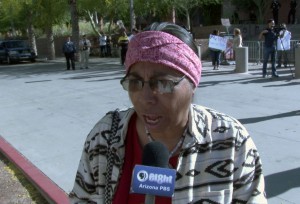- Slug: child-abuse cases protest, about 850 words.
- Video available here
- Photo available (thumbnail, caption below)
By ALEXIS DOMINGUEZ
Cronkite News
PHOENIX – An activist group claims some families have been falsely accused of child abuse and neglect. State and hospital officials responded they have to balance protecting children with respecting family rights.
Several families protested recently in front of Phoenix Children’s Hospital, then marched a few blocks to the Arizona Department of Child Safety building.
The activist organization Barrio Defense Committee is helping the families fight what they claim are false accusations of child abuse and neglect reported by the hospital and investigated by the child safety department.
The families’ claim the child-safety agency oversteps its authority in taking children away from their homes comes as the organization faces criticism it leaves some children vulnerable by not investigating cases in a timely manner.
A Cronkite News review of the Child Safety department showed it has failed to resolve more than 11,000 cases of alleged abuse or neglect that have been open for at least 60 days without an investigation or services being provided to a potential victim. A DCS spokesman said a better measure of productivity are the number of cases the agency closes rather than the number that come in.
The families who protested are not being named by Cronkite News to protect the children’s privacy.
“They still can’t give a concrete reason as to why they took them away. They just closed the case for negligence and abandonment,” she said.
A man who lost custody of his 11-year old autistic son said, “I cry because we feel helpless, like there is no one to listen to us.”
Another woman claims that DCS came to her home to file a report and asked her legal status.
Rhonda Baldwin, a social worker at Phoenix Children’s Hospital, did not address the specific cases but said it is a common misconception that people believe employees of the hospital are to blame for children being removed from a home.
The hospital is required by law to reported suspected cases of abuse and neglect to the state. Hospital employees do not conduct investigations because that is the state’s responsibility.
“As mandated reporters, we’re mandated by law to report if a child might be at imminent risk,” Baldwin said. “It tells you right on the hotline, if you call in a frivolous report there can be repercussions for that.”
The Department of Child Safety, formerly known as Child Protective Services, did not answer questions about the specific cases but released a statement that it objectively assesses potential risk to a child before determining whether a child needs to be removed from home.
“We take our responsibility to protect children very seriously,” the statement says. “We need to delicately balance the rights of parents with the rights of child victims, and in the end, we must protect all people by exercising due diligence and good faith.”
Families were scheduled last week to meet with DCS to further discuss their individual cases.
The Cronkite News review shows a case backlog continues to vex the department. A Child and Family Services review by the U.S. Department of Health and Human Services in December found that when it came to assessing safety and risk, DCS did not include a “specific time frame for completing face-to-face contact with children who are the subject of a report of child maltreatment.” And in some cases, “investigations were kept open for long periods of time.”
A DCS spokesman offered a different view and outlined steps the agency is taking to reduce the backlog.
“A better measure, frankly, of where we are in terms of productivity of the agency is the number of reports that we are closing versus the ones that come in,” said spokesman Doug Nick.
“Every office in the state now is told to please complete 20 percent more of the reports that are coming in to chip away at that backlog and that’s what they’ve been doing. So it’s just a matter, really of a lot of hard work by our field staff and our supervisors out there in the offices and dedication and focus,” he added.
A state report last week from the Office of the Auditor General recommends DCS take a two-pronged approach to cases, which it calls a “differential approach.”
Agency officials could choose a “traditional investigative response to a report of child abuse or neglect” or choose an alternative path that “focuses on engaging families to assess needs and then connecting them with appropriate services.” That response would be used in situations where there are low or moderate risk of child danger, the auditor’s report says.
One potential advantage of differential response is that families may feel more engaged and satisfied with the child welfare system than they do going through an investigative response,” the auditor’s report says.
DCS officials, in a written response to the report, say the agency will approach the Arizona Legislature to consider setting up a differential response system.
Cronkite News reporter Erica L. Lang contributed to this report.
^__=
